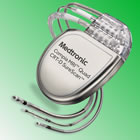|
"The ability to provide CRT-D patients with access to MRI scans is a significant, necessary advancement that may help save lives," said Prof. J. Schwitter, cardiologist and director of the Cardiac MR Center at the University Hospital Lausanne, Switzerland. "The most common magnetic field strength for an MRI is 1.5T, particularly for cardiac MRI; however, many institutions are installing 3T scanners to provide increased image clarity for conditions involving the brain and spine. With expanded access to 3T scans, physicians can now use a broader spectrum of MRI machines to most accurately diagnose critical and even life-threatening conditions." As many as 40 percent of CRT patients will need an MRI within four years after receiving a device.[1] However, until the availability of MR-conditional CRT-Ds, patients with these devices were contraindicated from undergoing MRI scans because of the potential interaction between the MRI and the device function, which could result in risk to the patient. This has prevented thousands of heart failure patients from receiving an MRI scan, an important imaging technology used by doctors to diagnose conditions such as stroke, cancer, Alzheimer's disease, and muscle, bone and joint pain. The Claria MRI CRT-D features the EffectivCRT™ Diagnostic and the EffectivCRT™ during AF algorithm, which automatically adjusts pacing rates - without adversely affecting the average heart rate - to tailor the therapy to individual patients. The Claria MRI and Amplia MRI CRT-Ds also feature the Medtronic-exclusive AdaptivCRT™ algorithm, which has been shown to improve CRT response rate by 12 percent 2, and to reduce risk of atrial fibrillation by 46 percent compared to echo-optimized biventricular pacing. [3] They also enable Multiple Point Pacing, which can stimulate two sites on the left ventricle (lower chamber) simultaneously. Additional features available in all three devices include:
In addition to the full line of CRT-Ds, Medtronic MR-conditional cardiac rhythm and heart failure devices and leads previously approved for 1.5 Tesla are now approved for full body scans in both 1.5 and 3T MRI machines in Europe. These include: Advisa MRI™ and Ensura MRI™ pacemakers, Micra™ transcatheter pacing system, Reveal XT™ and Reveal LINQ™ insertable cardiac monitors (ICMs), and Evera MRI™ and Visia AF MRI™ implantable cardioverter defibrillators (ICDs). Medtronic MR-conditional devices also include Deep Brain Stimulation (DBS) neurostimulators and spinal cord stimulators. "Medtronic is committed to providing patients with the most advanced MR-conditional technology available in cardiac rhythm and heart failure devices so they can have full access to essential MRI scans," said David Steinhaus, M.D., vice president and general manager of the Heart Failure business, and medical director for the Cardiac Rhythm and Heart Failure division of Medtronic. "With this latest regulatory milestone, Medtronic now provides both 1.5 and 3T MR-conditional pacemakers, ICMs, ICDs and CRT-Ds in Europe." In collaboration with leading clinicians, researchers and scientists worldwide, Medtronic offers the broadest range of innovative medical technology for the interventional and surgical treatment of cardiovascular disease and cardiac arrhythmias. The company strives to offer products and services that deliver clinical and economic value to healthcare consumers and providers around the world. About Medtronic Any forward-looking statements are subject to risks and uncertainties such as those described in Medtronic's periodic reports on file with the Securities and Exchange Commission. Actual results may differ materially from anticipated results. Source: Medtronic plc |

